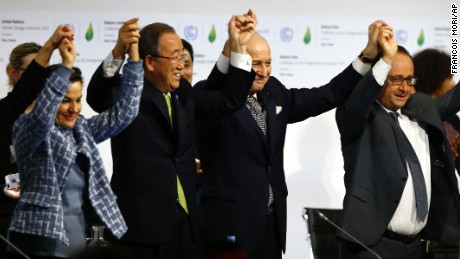Climate Deal Reached In Paris
Climate deal reached

NEW DELHI: Representatives of 195 countries signed a climate accord that will, for the first time, commit every nation to lowering harmful greenhouse gas emissions in the efforts against climate change.
The deal was met with huge cheers and jubilation from the delegates present, as it represents a historic breakthrough that ends the impasse on climate negotiations. The deal requires every country, rich or poor, developed or developing, to commit to reducing emissions, whereas such pacts traditionally called on developed nation such as the United States to take action to lower emissions, exempting countries like India and China -- the third and second largest emitters of greenhouse gasses, respectively -- based on the argument that these countries had growth targets to meet.
“This is truly a historic moment,” the United Nations secretary general, Ban Ki-moon, said, as quoted in the New York Times. “For the first time, we have a truly universal agreement on climate change, one of the most crucial problems on earth.”
US President Obama, who has outlined tackling climate change as the central legacy of his presidency, spoke on the deal from the White House. “This agreement sends a powerful signal that the world is fully committed to a low-carbon future,” he said. “We’ve shown that the world has both the will and the ability to take on this challenge.”
Although the deal is truly historic, it is incorrect to think that it will solve the challenges posed by planet-warming emissions on its own. According to scientists and experts who have analysed the deal, at best it will cut global greenhouse gas emissions by about half enough as is necessary to stave off an increase in atmospheric temperatures of 2 degrees Celsius or 3.6 degrees Fahrenheit. This increase -- of 2 degrees Celsius -- is the point at which there is no turning back, as the world will be set on course for devastating consequences in the form of rising sea levels, severe droughts and flooding, water shortages and massively destructive storms.
Nevertheless, the deal is important as it signals a shift from fossil fuel dominated energy markets toward renewable energy sources, hoping to bring to an eventual end an era dependent on coal, oil and gas as primary energy sources and bringing in zero-carbon energy sources like solar, wind and nuclear-power.
The deal is also significant given the fact that just five years ago, a similar attempt to arrive at a global deal on climate change in Copenhagen in 2009 collapsed without any headway. In the five years since, scientists have pointed out that the effects of global warming have made their presence felt -- from huge floods to severe droughts the world over. Global warming, experts said, is no longer a problem for future generations, but a very real issue for the world as it is today.
A major reason for a deal being possible is the relationship between the US and China and India, respectively. Bilateral negotiations between the US and the two Asian countries has enabled the willingness on the part of both India and China to commit to reducing greenhouse gas emissions. China has even declared a peaking year.
India on Sunday welcomed the deal. Union environment minister Prakash Javadekar called the deal “balanced” and said, “After the first glace of the final text, we are happy that the text contains and take care of concerns of India. It is linked with the convention (United Nations Framework Convention for Climate Change (UNFCCC) while Common But Differentiated Responsibilities (CBDR) is imbibed in it… More importantly, differentiation for developed and developing countries are mentioned across all pillars of action - mitigation, adaption, finance, technology capacity and transparency. That is a very important thing” (as quoted in TOI).
Secretary of State John Kerry, who has reportedly spent the past year negotiating behind the scenes with his Chinese and Indian counterparts in order to help broker the deal, said, as quoted in The New York Times, “The world has come together around an agreement that will empower us to chart a new path for our planet.”
However, not everyone is entirely happy with the deal. Poorer nations had pushed for a legally binding provision requiring that rich countries appropriate a minimum of at least $100 billion a year to help developing nations shift to more environmentally friendly technology. In the final deal, that $100 billion figure appears only in a preamble, not in the legally binding portion of the agreement.



